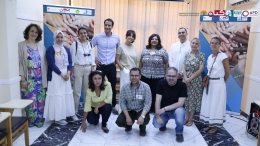"Continuation of the Law on the Rights of Persons with Disabilities 2018"
**Chapter Five****Social Treatment and Legal and Criminal Protection of Persons with Disabilities**
**(Section One) The Right to Social Protection**
**Article (25):**
Persons with disabilities are granted monthly assistance in accordance with the provisions of the Social Insurance Law issued by Law No. 137 of 2010, and the executive regulations of this law specify the criteria for eligibility for assistance mentioned herein. Exception to the provisions of the Social Insurance Law issued by Law No. 79 of 1975, persons with disabilities have the right to combine two pensions due to them for themselves or for their spouse, parents, children, siblings, or relatives without a maximum limit. They also have the right to combine what they receive from any pension regardless of their work income, and the government treasury shall bear this difference. The executive regulations of this law specify the conditions and controls for its implementation.
**Article (26):**
The competent administrative authority is obliged to allocate at least (5%) of the housing units established by the state or supported by it for persons with disabilities who are unable and meet the conditions and controls specified in the executive regulations of this law.
**Article (27):**
Persons with disabilities who reach the conscription age shall receive special treatment in recruitment areas, as well as in military medical commissions regarding the procedures for exempting them from military service and obtaining the certificate proving that, according to the rules and procedures issued by a decision of the Minister of Defense.
**Article (28):**
The state is committed to incorporating the rights and needs of persons with disabilities fairly and equitably in poverty alleviation programs and policies and in sustainable development programs it carries out. These programs and policies shall be implemented without discrimination based on disability and on an equal footing with others.
---
**(Section Two) The Right to Accessibility and Facilitation**
**Article (29):**
The competent administrative authorities responsible for planning and organizing and the entities listed in the Building Law issued by Law No. 119 of 2008, when issuing licenses for new buildings, must adhere to the Egyptian engineering code requirements for designing external spaces and buildings for the use of persons with disabilities. They must also adapt existing facilities to ensure ease of use for persons with disabilities in public and private buildings. The executive regulations of this law shall specify the forms of these facilitations, methods of providing them, and the controls and procedures for that.
**Article (30):**
The state and the relevant ministries of transport and other concerned entities are obligated to establish necessary systems to ensure accessibility and facilitate the movement of persons with disabilities, including allocating places for them in all types of transport across all categories and levels, while reducing their fares by no less than (50%) of the paid value, applicable to the person with a disability and their assistant, using technological accessibility means in transportation.
**Article (31):**
1. Licenses for the establishment of any type of building designated to serve persons with disabilities are exempt from legally prescribed license fees.
2. Licenses for modifying any existing building to facilitate the movement of persons with disabilities are exempt from legally prescribed license fees, but only to the extent of the modification value.
3. All assemblies, devices, educational and medical materials, assistive devices, and spare parts for persons with disabilities imported by an individual with a disability for personal use or by associations or institutions providing or supplying these items, according to the provisions of the Law regulating the work of associations and other institutions working in the civil society sector issued by Law No. 70 of 2017, are exempt from customs duties.
4. Vehicles and individual means of transport designated for the use of persons with disabilities are exempt from customs duties and value-added tax, provided they meet the conditions set forth in paragraph (3) of this article, and the exemption applies to any person with a disability, whether minor or adult, for one vehicle or means every five years. The driving or use of this vehicle or means is only permissible by the person with a disability, if their condition permits, as determined by the relevant authority responsible for issuing driver's licenses, or by their insured personal driver or a first-degree relative if they are a minor or unable to drive themselves. The sale or disposal of this vehicle or means is prohibited for five years from the date of customs clearance in any form unless taxes and prescribed fees are paid. The executive regulations of this law specify the rules and procedures for granting exemptions in all of the previous cases, as well as the possibility of placing signals indicating that this vehicle is designated for a person with a disability in coordination with the Ministry of Finance.
5. A person with a disability, whether claimant or defendant, is exempt from legal fees in lawsuits filed before various courts of different types and levels concerning the application of the provisions of this law or any other law related to the protection of these persons’ rights due to their disability. If the exempt person violates the conditions and controls set forth in this article or the executive regulations of this law, taxes, fees, and any other amounts prescribed by law for the same category at the time of violation shall be due without prejudice to any more severe penalties prescribed in this law or any other law.
**Article (32):**
The Ministry of Justice and the judicial authorities and entities affiliated with it are obligated to adapt their buildings and make them accessible for persons with disabilities in a manner commensurate with their disabilities and provide them with all services in an easy manner according to the Criminal Procedure Law and Civil Procedure Law, among others. Decisions shall be issued regarding these facilitations by the Minister of Justice and the relevant judicial authorities within three months from the date of issuance of this law.
**Article (33):**
All banks and financial institutions must adapt their buildings and make them accessible for persons with disabilities in a manner appropriate to their disabilities, providing all banking services in an easy and prepared manner for them, and establish a special system to facilitate banking transactions for them.
**Article (34):**
All government and non-government media are obliged to provide necessary languages to empower persons with disabilities and facilitate their communication with the media content that involves them appropriately, and to announce all services provided by public and private entities. Media of all kinds are also obliged to broadcast materials that portray them positively and respect their dignity. The executive regulations of this law shall specify the rules and procedures for making media accessible and the necessary languages to empower persons with disabilities.
---
**(Section Three) The Right to Legal and Criminal Protection for Persons with Disabilities**
**Article (35):**
A person with a disability, whether accused, victimized, or a witness, has the right to humane treatment that suits their condition and needs throughout all stages of apprehension, investigation, trial, or execution. They are entitled to protection and assistance, health and social welfare, and specialized technical assistance when necessary, and must have a lawyer to defend them during the investigation and trial stages. The law ensures all means of accessibility that enable them to express their defenses in the manner organized by the executive regulations of this law.
**Article (36):**
Without prejudice to the powers granted to courts and judicial investigation authorities, the data in the disability proof card and integrated services, once verified for accuracy, shall be taken into account when taking any legal action against the person with a disability during the stages of arrest, detention, investigation, or trial without the need for verification from another authority of the disability recorded under this card.
**Article (37):**
The Council must be notified immediately upon arresting any person with a disability, and the relevant authorities and the council must provide all means of health, social, technical, and legal assistance, including a psychological specialist and a lawyer; if a specialized doctor is required, they must be appointed.
**Article (38):**
The state shall take all reasonable arrangements and facilitations in transferring detained persons with disabilities and provide an accessibility code in all places of detention, prisons, and all other correctional institutions. The execution of prison sentences imposed on persons with disabilities shall occur in specially designated and separate locations, organized by a decision from the minister responsible for overseeing these places.
---
**Chapter Six: Political and Trade Union Rights for Persons with Disabilities**
**Article (39):**
Without prejudice to the provisions of Law No. 45 of 2014 concerning the organization of exercising political rights, the relevant authorities shall take special procedures for candidacy and voting processes in elections and referendums of all kinds, and the tools necessary to facilitate the participation of persons with disabilities in these processes, including the right to assistance from companions or helpers chosen by these individuals as needed.
**Article (40):**
The state guarantees the freedom necessary for persons with disabilities to establish organizations or specialized and regional unions for each disability and join them according to the law, ensuring their representation at both the local and international levels. Political parties, civil society organizations, unions, and federations are obliged to make available, facilitate, and encourage the participation of persons with disabilities in all forms of their activities with appropriate representation.
---
**Chapter Seven: Culture, Sports, and Recreation**
**Article (41):**
The Ministry and the relevant cultural authorities are committed to ensuring and facilitating the participation of persons with disabilities in cultural, recreational, and media activities, ensuring accessible venues for presenting and practicing these activities, and providing cultural products in languages and means suitable for each disability, for a nominal fee. They are also committed to creating sufficient opportunities to develop their creative, artistic, and intellectual abilities and encourage them, establish plans and programs for discovering talented individuals among them, recognize their cultural and linguistic identities, support their cultural and artistic activities and exhibitions, and promote the works of distinguished creators among them.
**Article (42):**
The state is committed to ensuring and facilitating sports and recreational activities for persons with disabilities and taking the necessary measures to adapt sports and recreational venues to enable them to access these places and provide the methods and means that facilitate their training opportunities and participation in the mentioned activities, as well as providing trained human resources, tools, and fields to enable their participation in local and international competitions and activities.
**Article (43):**
The ministry responsible for tourism and antiquities must support and create a cultural, community, environmental, and technological environment to activate tourism for persons with disabilities and improve the quality of tourism services provided to them in all forums and tourism locations, ensuring their ease of enjoying and visiting these places through activating the accessibility code technologically, spatially, and culturally, and training tourism guides in sign language and appropriate methods of communication in tourist places, and adapting artistic tourism presentations and sound and light shows for persons with disabilities to enjoy and attend, and supporting tourism and artistic festivals for persons with disabilities both inside and outside Egypt.
**Article (44):**
The competent authorities in culture and sports are required to allocate (5%) of the membership of the general assemblies of institutions working in the fields of culture and sports to persons with disabilities.
---
**Chapter Eight: Penalties**
**Article (45):**
Without prejudice to any more severe penalties provided for in any other law, violations of the crimes stipulated in the following articles shall be penalized by the penalties prescribed for them.
**Article (46):**
While considering the provisions of the Child Law No. 12 of 1996, a person or a child with a disability is considered to be at risk in any case that threatens the respect for their personal dignity, self-reliance, and discrimination against them due to their disability, in the following cases:
1. If their safety, morals, health, or life is endangered.
2. The unlawful detention of the person with a disability or their isolation from society without legal justification or the refusal to provide medical, rehabilitation, community, or legal care to them.
3. Physical or any other form of abuse against children with disabilities in institutions, rehabilitation centers, nurseries, and educational institutions, or sexual assault, harm, threats, or exploitation of them.
4. Use of therapeutic means or medical experiments that harm the person or child with a disability without legal justification.
5. The existence of children or persons with disabilities in upper-level classrooms in public or private schools without providing the necessary accessibility and adaptation for their special circumstances.
6. Failure to provide necessary treatment and proper food for children with disabilities, especially in cases requiring special dietary needs.
7. Failure to provide spatial, security, and guidance adaptation for persons with disabilities in their workplaces, subjecting them to violence, degradation, insult, hatred, or incitement to any of that.
8. Placing persons with disabilities in private institutions simply to dispose of them due to their disabilities in cases that do not warrant such detention.
**Article (47):**
Anyone who exposes a person with a disability to any of the risk situations mentioned in Article (46) of this law shall be punished with imprisonment for no less than six months and a fine of no less than five thousand pounds and no more than fifty thousand pounds, or one of these penalties.
**Article (48):**
Anyone who performs unlawful sterilization or abortion on persons with disabilities or incites such acts shall face harsh imprisonment.
**Article (49):**
A penalty of imprisonment for a period not exceeding ten years and a fine of no less than two thousand pounds and no more than ten thousand pounds shall be imposed on anyone who:
1. Falsifies the disability identification card and integrated services for persons with disabilities or the rehabilitation certificate, or uses either with knowledge of their falsification.
2. Provides false statements before the relevant authority or submits them to it, or conceals information with the intent to unlawfully benefit from any of the rights or privileges accorded to persons with disabilities under this law or another law.
**Article (50):**
Anyone responsible for the care of a person with a disability who neglects their duties towards them, or fails to take necessary actions to fulfill these duties, or refuses to carry out any of their responsibilities, shall be liable to imprisonment for a period not exceeding one year, and a fine not less than one thousand pounds and not exceeding ten thousand pounds, or one of these penalties. The penalty shall be imprisonment if neglect results in injury or harm to the person with a disability. If this neglect leads to the death of the person with a disability, the penalty shall be imprisonment for a period not exceeding ten years.
**Article (51):**
Anyone who applies for any service or benefit entitled to persons with disabilities under this law while being unqualified for it, or impersonates a person with a disability or helps others to impersonate such a person, or wrongfully seizes the property of a person with a disability inherited from them, or obtains a document, card, or certificate of disability without justification shall face imprisonment for not less than six months or a fine of not less than ten thousand pounds and not exceeding thirty thousand pounds. The fines shall accumulate for each instance of the offense committed.
**Article (52):**
A fine of not less than ten thousand pounds and not exceeding fifty thousand pounds shall be imposed on anyone who conceals data or information about the existence of a person with a disability from the relevant authorities for statistics and enumeration, and the penalty shall be doubled in case of recurrence.
**Article (53):**
A fine of not less than ten thousand pounds and not exceeding two hundred thousand pounds shall be imposed on anyone who displays, publishes, or broadcasts by any means of publication any data, information, images, graphics, or films that are harmful to persons with disabilities or subjects them to ridicule, or promotes incorrect concepts that harm them. The publication or broadcasting entity must exercise the right to reply and correction from the harmed person or their representative in the same time and space on the same medium.
**Article (54):**
Anyone who violates the provisions of Articles (22, 24, 25, 29, 30, 34) of this law shall be punished with imprisonment for a period not exceeding one year and a fine of no less than ten thousand pounds and not exceeding thirty thousand pounds, or one of these penalties. The fines shall accumulate for each instance of the offense committed.
**Article (55):**
The employer or the person responsible for the entity obligated to employ persons with disabilities may be ordered to pay monthly to the person with a disability who was nominated for employment but not hired an amount equal to the salary set or estimated for the work or position they were nominated for, commencing from the date of evidencing the commission of the offense for a period not exceeding one year. This obligation shall cease if the person with a disability is employed in a suitable job within the same entity or elsewhere. Anyone who violates this provision shall face imprisonment for a period not less than six months and not exceeding two years and a fine of no less than ten thousand pounds and not exceeding thirty thousand pounds, or one of these penalties. The fines shall accumulate for each instance of the offense committed.
**Article (56):**
Anyone who contributed to, participated in, or caused a child with a disability to be deprived of education shall face a fine of not less than five thousand pounds and not exceeding ten thousand pounds. Similarly, anyone who violates the provisions of Articles (11, 12) of this law shall face a fine of not less than five hundred pounds and not exceeding two thousand pounds, with the fines accumulating for each instance of the offense committed.
**Article (57):**
The person effectively responsible for the management of the legal person shall be jointly liable for the financial penalties and compensations ordered under this law if the crime was committed by one of its employees in its name and for its benefit, provided that they were aware of the crime and that their failure to fulfill the duties imposed by that management contributed to the commission of the crime.
**Article (58):**
The minimum penalty for any intentional crime shall be increased if it is committed against a person with a disability.
To learn more about the Law on the Rights of Persons with Disabilities 2018, you can visit our website: www.kayanegypt.com.









Comments (0)